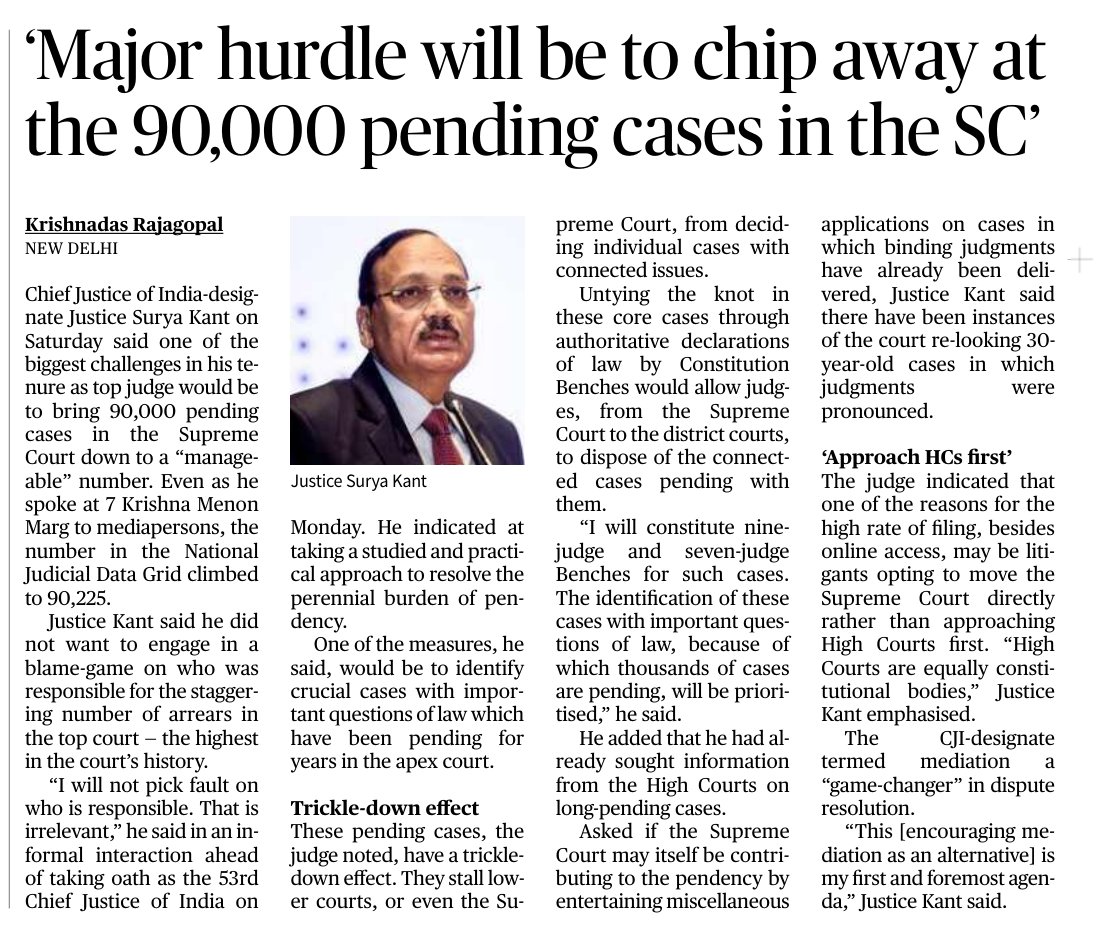
Supreme Court Warns: 90,000 Cases Pending, Adjournments Adding to India’s Justice Crisis
Justices BV Nagarathna and R Mahadevan say repeated adjournments worsen backlog in Supreme Court
Case involving Karnataka government sparks debate on accountability and urgent need for judicial reforms
By Our Legal Correspondent
New Delhi: November 26, 2025:
India’s Supreme Court has raised alarm over the growing backlog of cases, which now stands at nearly 90,000 pending matters. During a recent hearing, the Court strongly criticized the practice of lawyers frequently seeking adjournments, warning that such delays are pushing the justice system towards a breaking point. The remarks came from a bench comprising Justice BV Nagarathna and Justice R Mahadevan, who pulled up a lawyer representing the Karnataka government for requesting more time to obtain instructions in a criminal case.
Also Read: IBBI Issues New 2025 Guidelines to Speed Up Insolvency Professional Appointments Across India
The Incident
The case in question involved allegations of trespassing and theft of coffee beans from a private estate in Karnataka. When the lawyer sought adjournment to consult with her client, the bench expressed frustration. Justice Nagarathna observed:
“Whenever we ask a question, learned counsel will say I have to seek instructions. That’s how matters are getting adjourned. The pendency of this court is 90,000. Who is responsible for it? It will cross a lakh.”
This sharp rebuke highlights the Court’s growing impatience with procedural delays that contribute to the mounting pendency.
Why Adjournments Are a Problem
Adjournments are a common feature in Indian courts, often sought by lawyers to prepare arguments, consult clients, or gather documents. However, the Supreme Court has repeatedly warned that unnecessary adjournments:
- Delay justice for litigants who may wait years for resolution.
- Increase the workload of judges and court staff.
- Undermine public trust in the judiciary.
The Court’s latest remarks underline how adjournments, though sometimes necessary, are being misused and have become a major factor in the backlog crisis.
The Scale of Pendency
India’s judiciary has long struggled with case pendency. According to official data:
Also Read: CBDT Advisory: Taxpayers Must Disclose Foreign Assets and Income Under CRS & FATCA for Transparency
- The Supreme Court alone has about 90,000 pending cases.
- Across all courts in India, the backlog exceeds 5 crore cases.
- The average time for disposal of cases can range from several months to decades, depending on complexity.
Legal experts argue that unless adjournments are strictly regulated, the backlog will continue to grow, making timely justice nearly impossible.
Accountability and Responsibility
The bench’s question — “Who is responsible?” — goes beyond the individual lawyer. It points to systemic issues:
- Lawyers often seek adjournments for convenience.
- Government departments delay instructions, slowing down cases involving the state.
- Judicial infrastructure is stretched thin, with too few judges for the caseload.
- Procedural inefficiencies like manual filings and outdated systems add to delays.
This incident has reignited debate about accountability in the justice system. Should lawyers be penalized for unnecessary adjournments? Should government departments face stricter deadlines? These are questions now being discussed in legal circles.
Voices from the Legal Community
Legal commentators have welcomed the Supreme Court’s strong words. Many argue that adjournments should be granted only in exceptional circumstances. Senior advocates have suggested reforms such as:
- Imposing costs on parties seeking repeated adjournments.
- Setting strict timelines for government lawyers to obtain instructions.
- Digitizing case management to reduce procedural delays.
Others caution that lawyers sometimes genuinely need time to prepare, and blanket restrictions could harm fair trial rights. The challenge lies in balancing efficiency with justice.
Broader Implications
The Supreme Court’s remarks are not just about one case. They reflect a larger crisis in India’s judiciary:
- Litigants suffer: Ordinary citizens often wait years for justice, leading to frustration and financial hardship.
- Economic impact: Delayed resolution of commercial disputes discourages investment and slows economic growth.
- Social consequences: Criminal cases pending for years undermine deterrence and public confidence in law enforcement.
By highlighting pendency, the Court has drawn attention to the urgent need for judicial reforms.
Possible Solutions
Experts suggest several measures to tackle pendency:
- Increase judicial strength: India needs more judges to handle the caseload.
- Technology adoption: E-filing, virtual hearings, and AI-based case management can speed up processes.
- Alternative dispute resolution (ADR): Mediation and arbitration can reduce burden on courts.
- Strict adjournment rules: Courts could limit adjournments to genuine emergencies.
The government has announced initiatives like the National Judicial Data Grid and digitization of records, but implementation remains slow.
Also Read: India Marks Constitution Day: Remembering Ambedkar and 76 Years of the Nation’s Guiding Document
Conclusion
The Supreme Court’s rebuke serves as a wake-up call. With 90,000 cases pending in the apex court alone, India’s justice system is under severe strain. Adjournments, while sometimes necessary, are contributing to a crisis that affects millions of citizens. Unless lawyers, government departments, and the judiciary work together to reduce delays, the backlog will continue to grow.
The Court’s question — “Who is responsible?” — is not just rhetorical. It is a challenge to all stakeholders in the justice system to take responsibility and act before the pendency crosses one lakh and beyond.
Also Read: ITAT Rules: Purchases Backed by E-Way Bills Are Genuine, Not Bogus
Also Read: Supreme Court: Justice Needs Human Interpretation, Not Mechanical or AI-Based Application of Laws